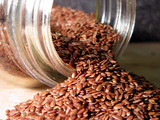 According to the researchers, 79 million Americans are pre-diabetic, with many of them classed as overweight or obese. This puts them at three times higher risk for developing type-2 diabetes than normal weight people, they added.
According to the researchers, 79 million Americans are pre-diabetic, with many of them classed as overweight or obese. This puts them at three times higher risk for developing type-2 diabetes than normal weight people, they added.A low dose of flaxseed (13 grams per day) for 12 weeks was associated with a significant reduction in insulin resistance, assessed using the homeostasis model (HOMA-IR), in overweight or obese men and postmenopausal women, according to findings published in Nutrition Research .
However, no such benefits were observed for the high dose group (26 grams per day), report researchers from the University of Colorado Colorado Springs, the University of Montana, and the University of Sherbrooke (Canada).
The researchers noted that flaxseed contains soluble fiber and lignans, both of which have reported benefits for pre- and type-2 diabetics. The seeds also contain the omega-3 ALA (alpha-linolenic acid). No changes were observed in inflammatory markers for any of the study participants, however, which led the researchers to reject the notion that ALA was responsible for the benefits.
Study details
Led by Andrea Hutchins, the researchers recruited 25 overweight or obese men and postmenopausal women with pre-diabetes to participate in their randomized, cross-over study. The participants consumed 0, 13, or 26 g ground flaxseed for 12 weeks. Interventions were followed by two week washout periods before crossing to a different intervention.
Results showed that the low dose (13 grams per day) flaxseed group experienced decreases in glucose, insulin, and HOMA-IR measures, but such decreases were not observed in the other two groups.
No significant changes were observed in any of the groups for fructosamine, high sensitivity C-reactive protein, adiponectin, and high-sensitivity interleukin-6.
Hutchins and her co-workers could not explain why only the low dose group experienced improvements, while the high dose group did not.
“A longer-term trial should include measurement of HbA1c [a marker of long-term presence of excess glucose in the blood], in addition to fructosamine as markers of long-term glycemic control,” they wrote.
“In addition, we recommend that participants track their fasting and post-prandial glucose values daily using a glucometer to better assess the day-to-day impact of flaxseed consumption on glucose concentrations.”





